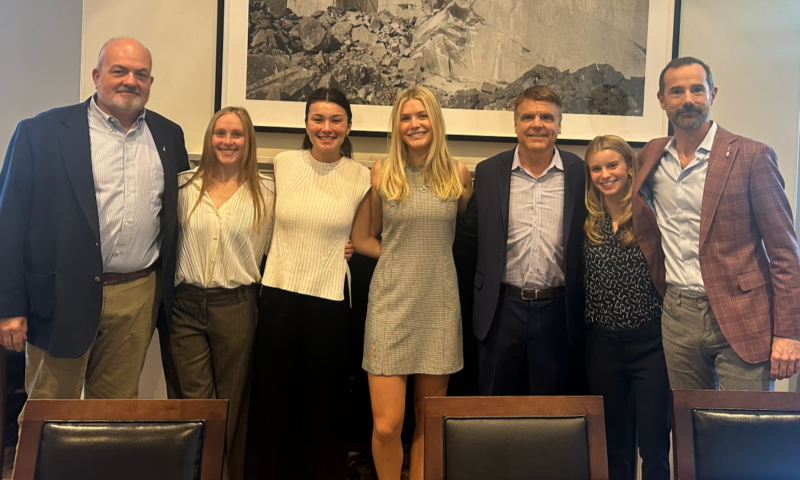
David C. Smith
What exactly goes on in the world of finance? What sorts of careers are open to students who study finance, and what are the challenges and rewards associated with such careers?
It was these questions, along with a host of related others, that were masterfully answered by nine outstanding alumni and friends during McIntire’s 2015 Careers in Finance Conference, held Sept. 10 and 11, 2015, in McIntire’s Robertson Hall auditorium. Organized exclusively for third-year McIntire students, the Conference offered in-depth explanations of—and fascinating insiders’ perspectives on—the array of careers available to students with an affinity for finance.
“The Careers in Finance Conference is designed not only to open students’ eyes to the wide range of opportunities available to them, but also to introduce them to the different skills, responsibilities, and rewards entailed by various careers in finance,” says McIntire Finance Professor David C. Smith, who played a key role in organizing the event. “The thoughtful, informative, and insightful presentations made by our speakers—all of whom are incredibly talented and accomplished finance professionals—made this an invaluable learning opportunity for the students in attendance.”
The Conference opened with an hour-long industry overview given by McIntire Finance Professor Peter Maillet, who made sure students understood the critical role, as intermediators of funds, that financial professionals play within today’s incredibly dynamic $300 trillion global capital markets. Students then heard 40-minute presentations from, and had the opportunity to ask questions of, leading professionals in the areas of boutique investment banking, asset and investment management, wealth management, and large-scale investment banking. The Conference also featured a panel of young professionals offering fresh, relevant perspectives on their respective financial workplaces.
Speakers at the event included Elizabeth Abrams, Managing Director, Millstein & Co.; Edward J. Finley (A&S ’87), former Managing Director, Deutsche Bank Private Wealth Management; Justine Johnson (McIntire ’14), Analyst, Wells Fargo Securities; Thomas A. Rogers (M.S. in Commerce ’13), Research Associate, Sands Capital Management; Steven Eelkman Rooda (McIntire ’12), Senior Investment Analyst, UVIMCO; Matthew Scheidemann (McIntire ’10), Associate, Millstein & Co.; Hayes Smith (A&S ’93, Law ’97, Darden ’97), Managing Director, Credit Suisse; Job Taylor (Ph.D., A&S ’03), Research Analyst, Sands Capital Management; and T. Perry Williams (McIntire ’94), CFA, Senior Portfolio Manager, Research Analyst, Director of Research, and Executive Managing Director, Sands Capital Management.
Futures and Options
Offering crystal-clear summaries of their respective roles within the world of finance, the speakers provided students with a feel for their day-to-day activities and responsibilities, as well as the particular skill sets and interests (beyond ace technical skills in finance and a passion for the field of finance) that they felt were necessary for success within those roles.
Abrams, a star Managing Director at New York-based boutique advisory firm Millstein & Co., kicked off the speaker presentations. Stressing the fact that “boutique firms’ small size doesn’t mean they’re working on small deals,” Abrams went on to discuss the critical roles she and her colleagues have played in such high-profile deals as the post-Chapter 11 debt restructuring of failed energy giant EFH—which in 2014 initiated one of the largest bankruptcy filings in U.S. history—as well as their current work in advising Puerto Rico on its troubled tangle of financial, legal, political and municipal bond market woes. Working at a boutique investment advisory firm such as the 35-person Millstein, Abrams said, requires an eagerness to tackle incredibly complex problems—and an appetite for learning about every aspect of a deal. “It’s a great opportunity to really learn about how companies and transactions work—and it comes with a ton of responsibility,” she said.
Abrams also told the students that working at a small firm offers the opportunity to partner with senior team members, who often seek to develop young talent for rewarding careers within the firm. “Boutique firms really offer a lot to students who have studied business as undergraduates,” said Abrams, noting that an M.B.A. isn’t always deemed necessary by such firms.
Asset and Investment Management
Rogers, Taylor, and Williams—speaking from the vantage of $47 billion growth-driven, fundamental research-based asset and investment management firm Sands Capital Management—helped illuminate another example of the fascinating careers available to students who excel in finance. After first explaining the firm’s primary mission, “to add value and enhance the wealth of our clients with prudence over time,” the three went on to describe the processes of meticulous research and rigorous on-the-ground due diligence, as well as the firm’s six strictly held criteria for investment, that the underlie the success of Sands’ enormous global portfolio. “We’re engaged in investing, not trading,” Williams stressed to the audience, noting that students who have strong research and analytical skills, and who enjoy the ongoing learning that comes with broad exposure to different industrial sectors and countries, might be well suited to careers at fundamentals-oriented investment firms such as Sands.
Still More Perspectives
The students were also treated to a colorful account of what it means to work in wealth management, offered by Edward J. Finley, most recently Managing Director, Deutsche Bank Private Wealth Management. Dismissing formulaic wealth management solutions as baloney, Finley told listeners, “The problems, questions, and emotions involved in issues of wealth management are never the same.” Indeed, he told the audience, students with superb communication and people skills, outstanding problem-solving skills, and an eagerness to tackle the complexities associated with every asset class may have the right stuff for careers in wealth management. Still, said Finley, who formerly worked as a lawyer specializing in international trust and estate planning, as well as in JPMorgan’s Private Bank, “when it comes to careers in finance, there’s really no straight-line path. You have to think hard about what you’re good at, what you have fun doing, and where there’s a job opening.”
Reflections for the Future
In addition to a superb presentation by Smith on the high-stakes, high-profile advising, underwriting, and financing work that goes on at investment banking powerhouse Credit Suisse, students had the opportunity to get the inside scoop on careers in finance from a panel of four young up-and-comers, all recent McIntire graduates.
Absolutely top-notch skills in the quantitative elements of finance, the four agreed, are only the baseline qualification for entry into the field. Beyond that, they said, thriving in the field requires finely honed qualitative skills in areas such as communication and time management, as well as unflagging attention to detail, analytic dexterity, a mastery of Microsoft Excel, and the ability to understand the broader context into which financially related problems and solutions fit.
But above all, the panelists said, success in finance largely comes down to sheer determination, fueled by a passion for the relentless pressures and complexities—as well as the fascinating learning opportunities—that characterize the field. “You’re going to be working long hours, and you’re going to be dealing with tough problems,” Johnson, of Wells Fargo Securities, told the audience. “But that’s exactly what I love about my job—that opportunity to face and successfully overcome those really tough challenges.”
By Mary Summers Whittle


